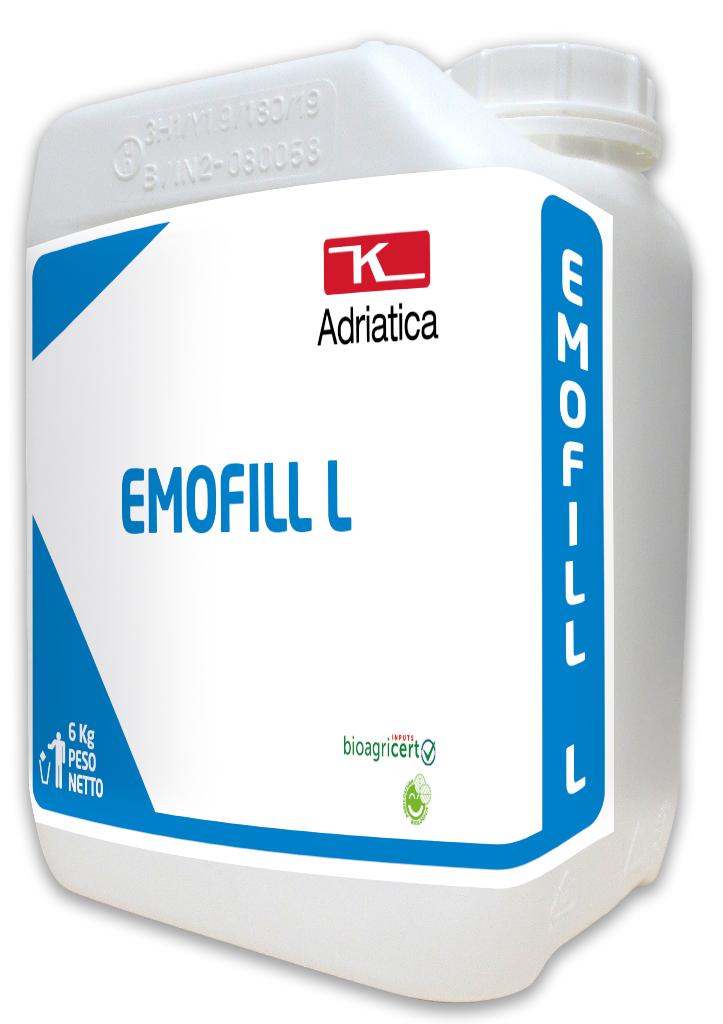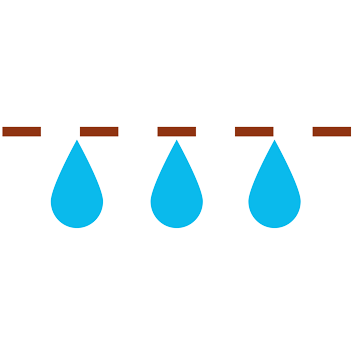

Packaging 6 - 25 kg
PHYSIOLOGICAL ACTIVATORS
EMOFILL L
IMPROVES ROOT MICROBIAL ENVIRONMENT
STIMULATES ROOT GROWTH
ENHANCES PLANT RESPONSE TO ABIOTIC STRESS
ALLOWED IN ORGANIC FARMING
EMOFILL L is a liquid organic fertilizer characterized by the presence of animal haemoglobin, which is produced in slaughterhouses according to strict sanitary protocols. The high content of both readily absorbable organic nitrogen and iron in the haemoglobin confer EMOFILL L strong anti-stress properties, making it useful in the first vegetative phases. The amino acids and proteins stimulate metabolic activities in the plants, resulting in pronounced tissue growth. EMOFILL L, applied through the root system, improves soil vitality and favours the growth of new roots.
| Culture | Time of application | Dose fogliare* | Fertigation dose* |
|---|---|---|---|
| Grapes | From vegetative restart to flowering, and from fruit set to pea-sized grape | 3-4 kg | 25-50 kg |
| Kiwifruit | From vegetative restart to flowering, and from fruit set to fruit enlargement | 3-4 kg | 25-50 kg |
| Olive e Citrus (Tangerine, Lemon, Clementine, Bergamot, Orange) | At vegetative restart | 3-4 kg | 25-50 kg |
| Stone fruits (Peach, Nectarine, Cherry, Apricot, Plum) e Pome fruits (Pear, Apple, Quince) | From vegetative restart to flowering, and from post-fruit set to fruit enlargement | 3-4 kg | 25-50 kg |
| Strawberries | From early vegetative phases to fruit enlargement, every 10-15 days, or whenever a prompt vegetative restart is required | 3-4 kg | 25-50 kg |
| Fruiting vegetables (Watermelon, Pumpkin, Zucchini, Tomato, Pepper, Melon, Eggplant, Cucumber) | From post-transplanting to fruit set, and during fruit enlargement | 3-4 kg | 25-50 kg |
| Leafy vegetables (Spinach, Celery, Escarole, Rocket, Radicchio, Lettuce, Chicory) | Throughout the whole crop cycle from post-transplanting, every 10-15 days | 3-4 kg | 25-50 kg |
| Industrial crops (Tobacco, Soybeans, Industrial tomato, Sunflower, Cotton, Rapeseed, Sugarcane, Beets) | In early vegetative phases, or whenever a prompt vegetative restart is required | 3-4 kg | 25-50 kg |
| Flowers and ornamentals | In early vegetative phases, every 10-15 days, or whenever a prompt vegetative restart is required | 3-4 kg | 25-50 kg |
| Nurseries e Seedbeds | In early vegetative phases, or whenever a prompt vegetative restart is required | 2 kg | 20 Kg |
-
Grapes3-4 kg25-50 kgFrom vegetative restart to flowering, and from fruit set to pea-sized grape
-
Kiwifruit3-4 kg25-50 kgFrom vegetative restart to flowering, and from fruit set to fruit enlargement
-
Olive e Citrus (Tangerine, Lemon, Clementine, Bergamot, Orange)3-4 kg25-50 kgAt vegetative restart
-
Stone fruits (Peach, Nectarine, Cherry, Apricot, Plum) e Pome fruits (Pear, Apple, Quince)3-4 kg25-50 kgFrom vegetative restart to flowering, and from post-fruit set to fruit enlargement
-
Strawberries3-4 kg25-50 kgFrom early vegetative phases to fruit enlargement, every 10-15 days, or whenever a prompt vegetative restart is required
-
Fruiting vegetables (Watermelon, Pumpkin, Zucchini, Tomato, Pepper, Melon, Eggplant, Cucumber)3-4 kg25-50 kgFrom post-transplanting to fruit set, and during fruit enlargement
-
Leafy vegetables (Spinach, Celery, Escarole, Rocket, Radicchio, Lettuce, Chicory)3-4 kg25-50 kgThroughout the whole crop cycle from post-transplanting, every 10-15 days
-
Industrial crops (Tobacco, Soybeans, Industrial tomato, Sunflower, Cotton, Rapeseed, Sugarcane, Beets)3-4 kg25-50 kgIn early vegetative phases, or whenever a prompt vegetative restart is required
-
Flowers and ornamentals3-4 kg25-50 kgIn early vegetative phases, every 10-15 days, or whenever a prompt vegetative restart is required
-
Nurseries e Seedbeds2 kg20 KgIn early vegetative phases, or whenever a prompt vegetative restart is required
-
 Foliar fertilization
Foliar fertilization
-
 Fertigation
Fertigation






